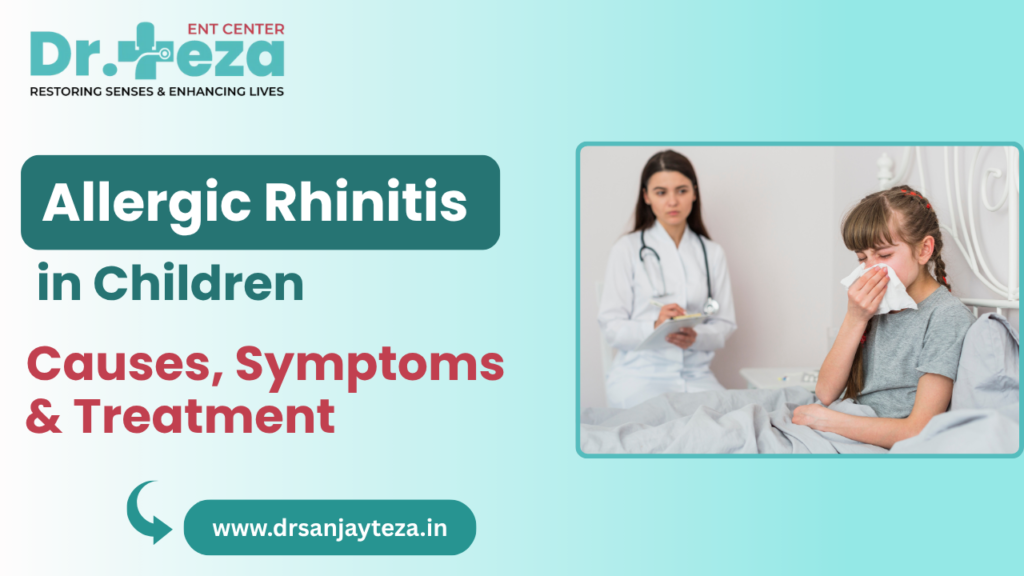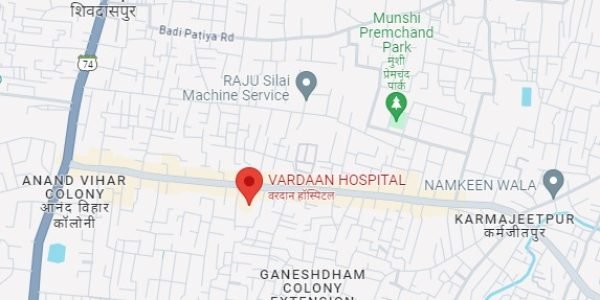
Allergic rhinitis, often referred to as hay fever, is a common yet often overlooked condition in children. It can significantly affect a child’s quality of life, sleep, and academic performance. At Dr. Sanjay Teza ENT Centre, our mission is to provide accurate diagnoses and effective treatment plans tailored to each child’s individual needs. In this blog, we’ll explore allergic rhinitis in detail—its causes, symptoms, diagnosis, and treatment options available in Varanasi.
What is Allergic Rhinitis?
Allergic rhinitis is an inflammatory reaction of the nasal passages to allergens such as dust mites, pollen, mold, or pet dander. It occurs when the immune system mistakenly identifies these harmless substances as threats, triggering the release of histamines that cause symptoms in the nose and sinuses.
It can be seasonal (pollen-related) or perennial (present all year round due to dust mites or mold).
Why Children Are More Vulnerable
Due to their maturing immune systems, children may be more susceptible to hypersensitivity if they are exposed to allergens at a young age. Children are also more susceptible to allergic rhinitis due to environmental factors such as pollution, inadequate ventilation, and secondhand smoke exposure.
Common Allergens That Trigger Rhinitis in Children
Understanding what triggers your child’s allergic rhinitis is the first step in managing it effectively. Common allergens include
- Pollen (from trees, grasses, weeds)
- Dust mites
- Pet dander
- Mold spores
- Cockroach droppings
- Strong odours (perfumes, smoke, cleaning agents)
Symptoms of Allergic Rhinitis in Children
The symptoms of allergic rhinitis can be confused with the common cold, but the persistence and recurrence of symptoms are the main distinguishing factors.
Key symptoms include
- Runny or stuffy nose
- Frequent sneezing
- Itchy nose, throat, or eyes
- Red or watery eyes
- Post-nasal drip
- Fatigue
- Cough (especially at night)
- Mouth breathing or snoring
- Dark circles under eyes (“allergic shiners”)
Diagnosis of Allergic Rhinitis
At Dr. Sanjay Teza ENT Center, we use a combination of detailed medical history, physical examination, and diagnostic tests to confirm allergic rhinitis in children.
Diagnostic methods include:
- Nasal endoscopy: To examine the nasal passages and detect inflammation or polyps.
- Allergy testing (Skin Prick Test or IgE Blood Test): To identify specific allergens.
- Sinus imaging (if necessary): In cases where sinusitis is suspected.
Early diagnosis is crucial to avoid complications like sinus infections, ear infections, and poor academic performance due to disturbed sleep.
How Allergic Rhinitis Affects Your Child’s Daily Life
Undiagnosed or untreated allergic rhinitis can lead to:
- Sleep disturbances and daytime drowsiness
- Poor school concentration and performance
- Behavioral issues or irritability
- Chronic sinus problems
- Increased risk of asthma
Treatment Options for Allergic Rhinitis in Children
Treatment focuses on symptom relief, allergen avoidance, and improving the child’s quality of life.
1. Environmental Control (Avoiding Allergens)
- Use dust-proof covers on mattresses and pillows.
- Wash bedding in hot water weekly.
- Keep windows closed during high pollen seasons.
- Use HEPA air purifiers.
- Regularly clean and vacuum the home using filters.
- Bathe pets frequently or limit exposure.
2. Medications
Medications may be prescribed depending on the severity and frequency of symptoms.
- Antihistamines: Reduce sneezing, itching, and a runny nose.
- Nasal corticosteroids: Most effective for nasal inflammation.
- Decongestants: For short-term relief from a blocked nose (use with caution).
- Leukotriene receptor antagonists: Helpful in children with asthma and allergies.
3. Immunotherapy (Allergy Shots or Drops)
For children with severe allergic rhinitis not responding to medications, allergy immunotherapy can be an effective long-term solution. It works by gradually desensitizing the immune system to the allergen.
Why Choose Dr. Sanjay Teza ENT Center for Your Child’s Allergy Care?
- Specialist in pediatric ENT care
- Advanced diagnostic tools and allergy testing
- Personalized treatment plans
- Child-friendly consultation environment
- Located centrally in Varanasi
As the best ENT doctor in Varanasi, Dr. Sanjay Teza ensures a compassionate and precise approach to managing allergic rhinitis in children.
Lifestyle Tips for Managing Allergic Rhinitis at Home
- Encourage nasal irrigation (saline spray) to clear allergens.
- Keep your home free from cigarette smoke.
- Maintain humidity levels under 50% to reduce mold growth.
- Teach children not to rub their eyes or noses.
- Maintain a consistent bedtime routine to help with sleep disturbances.
When to See an ENT Specialist?
You should consult an ENT specialist in Varanasi if:
- Your child has persistent nasal symptoms lasting more than 2 weeks.
- Over-the-counter medications are not helping.
- Breathing is affected, or there is loud snoring.
- Symptoms interfere with school or sleep.
- You notice facial pain, sinus pressure, or hearing problems.
Conclusion
Allergic rhinitis in children is manageable with early diagnosis, lifestyle changes, and the right treatment plan. Ignoring the symptoms can lead to long-term complications that affect your child’s well-being and academic performance.
If your child shows signs of persistent nasal allergy, visit Dr. Sanjay Teza, ENT Center—the best ENT specialist in Varanasi—for expert care and lasting relief.
Book your Appointment Today
- Visit our GMB profile: Dr. Sanjay Teza ENT Center
- Address:
✅वरदान हॉस्पिटल, सुंदरपुर, वाराणसी | 10AM–2PM
✅शाकम्भरी काम्प्लेक्स, भेलूपुर, वाराणसी | 5PM – -7PM - Phone: 093369 22349
- Website: https://drsanjayteza.in/
- Follow us on👉: Facebook & Instagram
Frequently Asked Questions
Q.1 At what age can a child develop allergic rhinitis?
Allergic rhinitis can develop as early as 2–3 years of age, but it’s more commonly diagnosed in children above 6 years.
Q.2 Is allergic rhinitis the same as a sinus infection?
No. While both involve nasal symptoms, allergic rhinitis is caused by allergens, whereas sinusitis is usually caused by infections and involves facial pain or pressure.
Q.3 Can allergic rhinitis be cured permanently?
While there is no permanent “cure,” allergic rhinitis can be effectively managed and sometimes reduced significantly with immunotherapy and consistent allergen control.
Q.4 Are allergy tests safe for children?
Yes. Allergy tests, like skin prick testing or blood tests, are safe, minimally invasive, and help in identifying specific allergens.
Q.5 Is a nasal spray safe for long-term use?
Nasal corticosteroids, when prescribed by a doctor and used correctly, are safe for long-term use. However, decongestant nasal sprays should be avoided for more than 3–5 days due to the risk of rebound congestion.
Q.6 Can diet affect allergic rhinitis?
While food is not a direct trigger for allergic rhinitis, a healthy immune-boosting diet can support the body’s resistance. Some children may have food-related cross-reactions (e.g., birch pollen allergy and apples).
Q.7 Is allergic rhinitis linked to asthma?
Yes, allergic rhinitis and asthma are closely linked. Many children with allergic rhinitis also have or may develop asthma. Managing allergic rhinitis can help control asthma symptoms.

